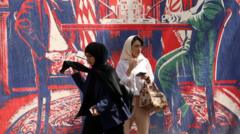Iran has augmented its production of highly enriched uranium, a recent report from the International Atomic Energy Agency (IAEA) indicates, which stipulates "serious concern" regarding Tehran's nuclear activities. According to the confidential report obtained by BBC, Iran's stockpile has skyrocketed to over 400kg of uranium enriched to 60% purity, a significant increase of nearly 50% over the past three months. This level of enrichment surpasses the threshold for civilian nuclear energy production and approaches that of weapons-grade material, providing insights into Iran's potential capability of developing nuclear weapons, potentially up to ten, if further processed.
Iran insists that its nuclear program is solely for peaceful purposes, but the IAEA has expressed inability to verify this assertion. In fact, the report notes that Iran is producing highly enriched uranium at a pace comparable to one nuclear weapon per month. Director General Rafael Grossi of the IAEA voiced concerns, stating, "The significantly increased production and accumulation of highly enriched uranium by Iran... is of serious concern," as it may provoke reactions from countries involved in nuclear diplomacy.
Following this report, Israel condemned Iran’s nuclear ambitions, asserting that the level of enrichment reached by Tehran aligns only with preparations for a weapons program. Israeli Prime Minister Benjamin Netanyahu's office stated, "Such a level of enrichment exists only in countries actively pursuing nuclear weapons and has no civilian justification whatsoever." In response, Iranian Foreign Minister Abbas Araghchi affirmed that nuclear weapons are considered "unacceptable" by Tehran.
US officials predict that if Iran decides to pursue a nuclear weapon, it could fabricate weapons-grade material in under two weeks, achieving functionality within several months. The IAEA report also surfaced previously unexplored issues about Iran's nuclear activities, suggesting clandestine projects were conducted until the early 2000s at multiple unknown sites.
Despite ongoing negotiations aimed at reaching a new nuclear deal, the report lacks any evidence suggesting Iran has curbed its enrichment activities. Negotiations initiated in April have been met with mixed optimism and significant disagreements, particularly regarding Iran's right to enrichment under any forthcoming agreement.
While Iranian leadership, including advisors to Supreme Leader Ayatollah Ali Khamenei, has hinted at the potential reconsideration of the country's stance on nuclear weapons amid heightened international pressure, such remarks have intensified apprehensions among Western officials about Iran becoming a nuclear threshold state. The IAEA's board is anticipated to convene soon to discuss the situation further, with the possibility of escalating the matter to the UN Security Council in subsequent meetings.












